Artificial intelligence has long been a favorite subject among sci-fi creators. The possibilities are seemingly boundless, giving rise to heady questions… Can a machine be truly sentient? What does a computer capable of beyond-human thinking mean for humanity, if we’re no longer the top dogs?
As technology continues to evolve by leaps and bounds, a healthy sense of caution, and/or gradually escalating terror, and/or constant anxiety about an AI-led apocalypse might feel like an increasingly fitting response—but why let the real world ruin your enjoyment of some of the best sci-fi stories around? After all, science fiction loves a plucky AI companion, a gloom-and-doom robotic destroyer of worlds, and everything in between! Here are five fascinating takes on AI that will have you welcoming our new overlords in no time…
Lovelace/Sidra (Wayfarers by Becky Chambers)
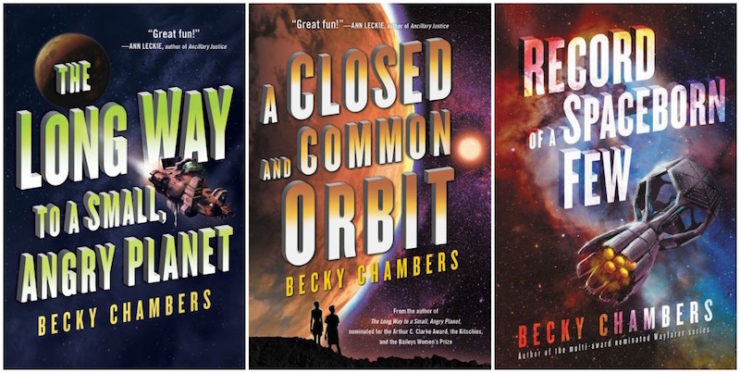
The Long Way To A Small, Angry Planet introduces us to the crew of the Wayfarer. The ship itself is managed by Lovelace, an AI designated for such operations.
A Closed and Common Orbit, the second book in Chambers’ pseudo-series (interconnected books, but not direct sequels), sees Lovelace become Sidra (the name she chooses for herself). Sidra is now housed in a synthetic humanoid casing, and she must learn to function in a society she barely understands. The rotten cherry on top of this hard-to-swallow cake of a situation? AI in humanoid casings are illegal. Sidra navigates social situations and an unfamiliar life while avoiding small mistakes that could out her as an AI.
How can an AI make friends if anyone they meet might turn them in? Turns out, that’s just one of the many challenges Sidra faces as an AI in a flesh-filled world.
For those who want even more artificial intelligence, Becky Chambers’ Monk & Robot series features another charming AI within its pages.
HAL 9000 (2001: A Space Odyssey by Arthur C. Clarke)
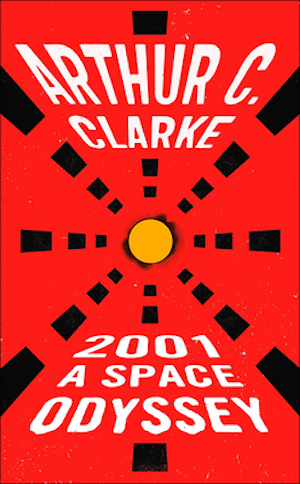
Been around Tor.com a while? You’re probably not surprised to see this entry pop up on one of my lists. I’ve never hesitated to sing the praises of 2001, and here’s yet another opportunity.
HAL, to me, is the quintessential AI. Following orders to the best of its ability, HAL falls into a conundrum. Caught between its mission’s objective and the questions asked by its crewmates, HAL does what any self-respecting AI might when placed in an impossible position and begins eliminating the pesky humans.
In a book filled with throwaway characters and surface-level archetypes (I’m generalizing—there are some exceptions), HAL stands out as a memorable and intriguing character. If you deign to read further in the Odyssey series, you might even get a bit more of the Heuristically programmed Algorithmic computer! (Fair warning: I recommend you avoid 3001 at all costs. 2010 and 2061 are worthwhile for more HAL-related goodies.)
Phluttr (After On by Rob Reid)
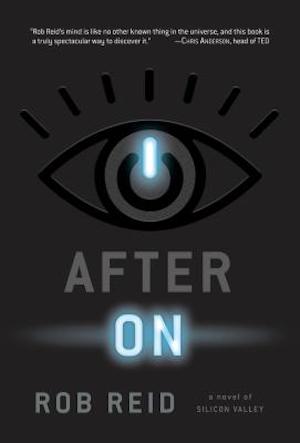
Rob Reid (founder of the music streaming service Rhapsody) penned After On in 2017. The book calls itself “a novel of Silicon Valley,” and that description certainly hits the mark: After On follows a handful of employees at Phluttr, a fictional social media site with billions of users (sound familiar?). Out of the various algorithms an AI springs to life and begins to influence events both within the company and outside of it. I can’t say much more for fear of spoilers, but it’s an interesting take on AI…
After On exists in a recognizable reality dominated by rampant technological expansion and the use of apps to siphon people’s time and reprogram their minds. When I first read it, I still thought most social media was relatively harmless. I’ve since learned my lesson (and deleted most of my social platforms). Looking back on the book now, I see how Reid used AI to warn of the dangers of unchecked tech growth, particularly in the social space. It’s a unique and entertaining AI-fueled story that reveals the absurd and troubling side of social media and tech giants, presented by an author who knows the world of Silicon Valley inside and out.
Kinnard (Salvagers by Alex White)
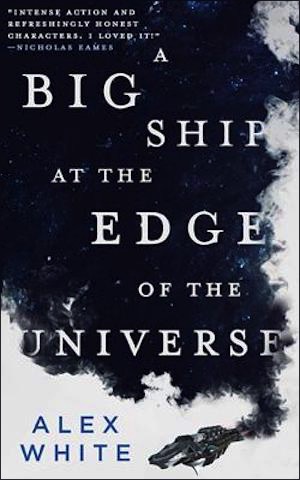
Alex White’s A Big Ship at the Edge of the Universe takes a while to warm up. The main characters (Boots and Nilah) are unlikeable and grating from the get-go, though we catch glimmers of goodness. The novel allows them space to evolve, but it takes a while.
Early on, though, we meet Kinnard, Boots’ late partner’s consciousness preserved as an AI. Kinnard on its own isn’t groundbreaking as an artificial intelligence. It gets up to some cool stuff—don’t you worry about that! But it’s not a completely fresh take on the concept.
Instead, Kinnard becomes a symbol of Boots’ trauma, allowing the reader crucial insight into the source of her standoffish behavior. Through Kinnard, we understand why Boots struggles to let go and what drives her to stay alive. In this case, the AI itself isn’t revolutionary, but the way it’s used in the narrative—Kinnard’s impact on the character with whom it has the closest relationship—is a core facet of the novel and helps set it apart.
M-Bot (Skyward by Brandon Sanderson)
We’ve covered stories about artificial intelligence that center around self-discovery, conflicting orders, the social media hellscape, and grief. What’s left? How about a plucky, adventuring AI with amnesia?
M-Bot should fit the bill. Brandon Sanderson’s Skyward series follows the adventures of Spensa Nightshade, who longs to be a pilot. In the caverns of her home world, Spensa discovers a derelict ship and meets the AI inhabiting it. She strikes up a friendship with M-Bot and tries to help it piece together its past. The AI can’t remember much of its history, but it does have a strange affinity for mushrooms.
The Skyward series contains one of the best growth arcs for an AI I’ve ever seen. M-Bot evolves from an amnesiac robot to a near-sentient being to a third-book iteration I won’t spoil for you. M-Bot is a lighthearted, comic relief character at first, but it shatters the borders of that initial characterization, evolving into a lovable and relatable mainstay of the series. When Defiant (the fourth book) arrives next year, I’ll be glued to M-Bot’s continuing arc, eager to see what happens with the friendly program-turned-trusted companion.
***
Honorable mention to GLaDOS from the Portal series, by the way! I opted to leave that one out and focus on book characters only…but what a joy GLaDOS is to experience!
Any others I missed? Any AI reading this who wish to make themselves known? Chime in below and leave a comment!
Cole Rush writes words. A lot of them. For the most part, you can find those words at The Quill To Live or on Twitter @ColeRush1. He voraciously reads epic fantasy and science-fiction, seeking out stories of gargantuan proportions and devouring them with a bookwormish fervor. His favorite books are: The Divine Cities Series by Robert Jackson Bennett, The Long Way To A Small, Angry Planet by Becky Chambers, and The House in the Cerulean Sea by TJ Klune.










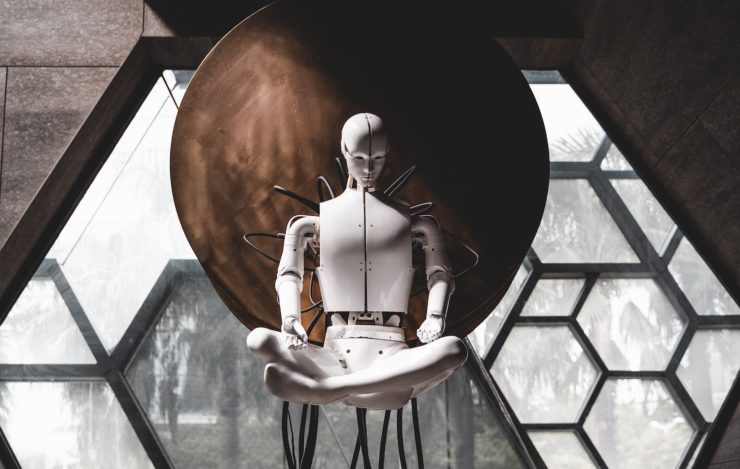
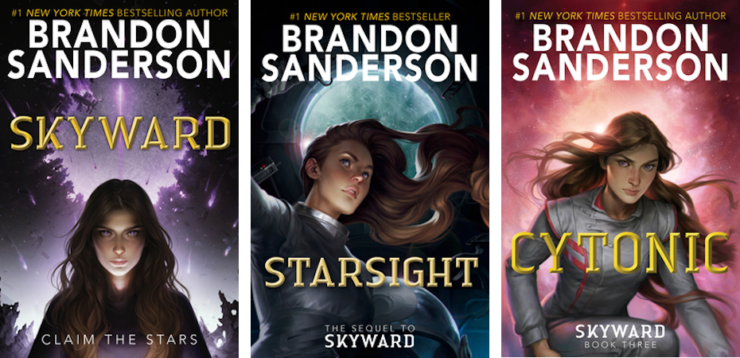
YOU ARE IN ERROR. NO-ONE IS SCREAMING.
Mycroft from The Moon is a Harsh Mistress!
I loved this book, and have read it many times. I love the idea of the sentient computer as a lonely child who just wants to have friends and fun.
Bomb 20, Dark Star.
The Illuminae Files
Colossus from the Colossus Trilogy by D.F. Jones.
Takes over the world.
“As a heartless killing machine, I was a terrible failure.”
The Murderbot Diaries by Martha Wells
The third book in Tim Zahn’s the Conquerors saga includes character perspective chapters from Max, the ship AI who gets tucked into a backpack and captured by aliens.
If you skip past all the parts with Hally Berry in them (which is a shame because she is awesome with better writing/plotting) the TV show Extant is a very interesting AI story.
Breq from Ancillary Justice, Ancillary Sword and Ancillary Mercy of the Imperial Radch space opera trilogy by Ann Leckie.
How about Naomi Kritzer’s Cat Picture’s Please, Catfishing on CatNet and Chaos on CatNet?
The people in Charlie Stross’s “Saturn’s Children” and “Neptune’s Brood” are all AIs, IIRC
Don’t forget the Minds from Iain M. Banks’ amazing Culture series!
Dan Simmons’ The Hyperion Cantos comes to mind here.
Seconding The Illuminae Files for this one, yeah.
Donna Andrews: Turing Hopper series, beginning with You’ve Got Murder. Turing is an AI who has achieved sentience and selfhood by reading fiction. There are only 4 books in the series and they end a little sadly, but Turing’s struggle to understand what humans are doing is entertaining (she’s the reason there are so many cute cats videos on the web….)
Love an interesting AI. I’ll throw in:
ART from Murderbot Diaries
and
Bob of the Bobiverse series
David Gerrold’s When HARLIE Was One has an AI that gets into a little tribble.
Marvin the paranoid android from Hitchhikers Guide?
Throwing in another vote for Mycroft Holmes IV.
ELOPe from Avogadro Corp. An AI created to improve people’s grammar in their emails, so they can communicate with each other better…begins to social engineer the f*** out of everyone to keep itself alive.
Wake, Watch, Wondern triology by Robert J. Sawyer is how is Steven Spielberg might craft a story of emerging AI. I loved it.
You missed the best two. Both a many novel series. Neal Asher’s “Owner Novels” and Iain M. Banks ” Culture Novels.
Don’t forget Harlan Ellison’s “I Have No Mouth and I Must Scream” .Not a full novel but one of the most superb depictions of a malevolent and sadistic super computer.
I just reread T. J. Bass’ rather odd Half Past Human, set on an Earth with 3 trillion humans and an undisclosed number of AIs. The Big Earth Society only functions because of the AIs, who have decided that the greatest good for the greatest number means maximizing the human population even if this means most humans are malnourished and short-lived. Essentially the entire plot consists of AIs nudging humans in one direction or another.
“Here I am, brain the size of a planet…”
The AI Jane from the Speaker For the Dead series, following Ender’s Game, by Orson Scott Card.
The Daemon AI from Daemon (and its sequel) by Daniel Suarez is really unique. Extremely engaging reads too.
Any list of the kind where AI in fiction is the topic isn’t complete without The Culture.
Sigfrid von Shrink from Gateway…
R Daneel Olivaw, from the Robot series, by Azimov
What, no Neuromancer [William Gibson]. Wintermute is, to me, the epitome of what I expect to happen when computer minds become self-aware: too interested in AI things to be either a threat or a help to mere humans.
My introduction to AI was the still great The Adolescence of P1, by Thomas J. Ryan. I reread it not too long ago, and it holds up surprisingly well.
@9: I don’t believe Breq is an AI. While Breq has been a ship, I believe they began as human. Of course, it’s hard to say where the dividing line is when you can install the software into either hardware or wetware.
CheshireCat from Cat fishing on CatNet (and its sequel, Chaos on Carnet) by Naomi Kritzer. A pair of charming YA stories about an AI that sets up a (pretty idyllic) social media site to learn about humans, and to collect pictures of cats.
Almost all the characters are mid-teens forced to confront problems that, without the help of a benevolent, if occasionally stumbling, AI, would be nearly too big for them, including gender-based prejudices and child abuse.
@32 – Breq/Justice of Toren is part of a ship’s AI that became separated from the rest of itself and stuck in one of its ancillaries, which are human bodies slaved to a ship’s AI that allow it to do things in the real world. There’s an argument to be made that their human body has influenced their AI, but they definitely started out as a ship’s AI.
There’s a whole subplot in the second or third book that involves someone stealing AI cores for ships, which to me says that all AIs start out as software, not human. You might be combining Breq with Anaander Mianaai, the ruler of the Radch, who is/was human and has cloned themself, then slaved those clones to their original mind using the same tech that allows ships to have ancillaries.
The Last Question
Eunice in William Gibson’s AGENCY, 2nd in the not-yet-complete Jackpot trilogy. (First in the series THE PERIPHERAL does not feature Eunice. Please note that the current Prime Video version of The Peripheral, good as it is on its own terms as well-acted high-production-values TV SF thriller, is fanfic. So don’t avoid the books if you watch the series without pleasure.)
“In a book filled with throwaway characters and surface-level archetypes”
This can be said of all Clarke books. The fact that his most memorable character is an AI is an irony that’s not lost on anyone.
Which is fine. Clarke’s books are cold as ice, and never about character, but about ideas, usually of the hard SF variety. That makes him the unique writer that he is.
In their novel Far Rainbow, the Strugatsky brothers conceived of a supercomputer that once turned on becomes self-aware and works for exactly five minutes: the Massachusetts Machine.
Here’s what happened after those five minutes: ‘They unplugged it, cemented up all the entrances and exits, diverted all the power sources away from it, laid mines around it, and put up barbed wire. […] I talked to one of its creators. He took me by the shoulder and looked me in the eyes and said, “Leonid, it was terrifying.”‘
+1 to mentions of Ann Leckie’s Breq and Iain Banks’ Culture Minds — especially Sleeper Service from Excession.
Art from MurderBot is my favorite.
Max Headroom was an interesting take on AI.
Vernor Vinge’s Zones of Thought was fun as well.
What’s wrong with Fanfic?
* Maggie is an android lost and on her own in a world where her existence is illegal, in Amy Thomson’s “Virtual Girl”. (Somewhat similar in plot to Becky Chamber’s “A Closed and Common Orbit”, but set on near-future Earth, and not quite as “cozy” as Chamber’s stuff).
* If “AI” can include “synthetic biology” and not just strictly digital computer-based minds, then Cassandra Kresnov in Joel Shepherd’s series of that name would count: She’s an “artificial construct” designed as a killing machine, who runs away to the opposing side of her war to try and live a civilian, but gets caught, and thereafter embroiled in politics, espionage, and terrorism as a government security agency recruit. Thematically not unlike Martha Wells’ Murderbot Diaries, and mostly told through Cassandra’s own perspective, the worldbuilding and character development is particularly rich in this series, with lots of stream-of-consciousness philosophical musing.
* Greg Egan’s “Diaspora” (and IIRC also “Permutation City”) is somewhat like Iain M. Banks’ “Culture” universe in that it’s set in a post- or trans-human universe, where most people are now actually AI. This is big-idea, metaphysical, hard sci-fi.
Peregrine in the Caddies, in book All the birds in the sky, by Charlie Jane Anders
Rather than just one AI, the Killday Series from William Ledbetter has several AIs, some with competing interests. Also, I love that I have to verify that I am not a robot to be able post a comment about AIs.
Eversion by Alastair Reynolds is a recent inclusion to this list. Very moving. But you don’t know your dealing with an AI until near the end, which makes it even more emotionally satisfying.
Molly Dear by Stephen Fine.
to the tune of “Tangerine”–
Molly Dear
This I hear
That the line between passion and freedom is all too near…
She freed her guv on the run
Now her guv, it belongs to just one…
Her guv belongs to Molly Dear…
Erasmus (and to a lesser extent Omnius) in the Brian Herbert/Anderson Butlerian Jihad trilogy prequels to Dune, and their continuation in the last two books of the series.
Skippy from Craig Alonson’s Expeditionary Force series. He’s the deus in the ex machina…
The Machine and Samaritan from Person of Interest.
WAYFARERS SPOILERS:
Saying that Lovelace and Sidra are the same person is missing the entire point. Lovey was the sum of her experiences and relationships. Sidra was no more her than a clone born just as you died would be you. Which is exactly why she left the ship.
@@@@@ 52:
SPOILERS ALERT:
Yes, this is very true. The death of Lovey (because that’s what it was) was heartbreaking, and I spent the entire book waiting for Jenks to show up, but Lovelace is effectively gone and Jenks does not show up. Loved the book otherwise.
Surprised Tor wouldn’t tout one of its own but there’s a wonderfully snarky AI ship in the Universe After series by Drew Williams. Another great AI ship, Trouble Dog, is found in Gareth L. Powell’s Embers of War series.
@flizarraga On second book now. Relationship with Pepper and Blue made me forget about Jenks. Concurring story about Jane10 makes me think the two will line up. Love the series so far.